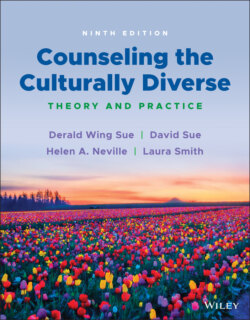Читать книгу Counseling the Culturally Diverse - Laura Smith L. - Страница 73
FOCUS ON THE INDIVIDUAL
ОглавлениеMost forms of counseling and psychotherapy tend to be individual‐centered. In other words, conventional psychotherapy positions the individual client as the target of treatment and the location of needed change. Personal problems, therefore, are generally conceptualized as lying somewhere within the intrapsychic configuration of the individual. Ivey et al. (2014) noted that U.S. culture and society are based on the concept of individualism and that competition between individuals for status, recognition, and achievement forms the basis for ideas of success. Individualism, autonomy, and the ability to become your own person are perceived as healthy and desirable goals. Pedersen and Pope (2010) observed, however, that not all cultures view individualism as a positive orientation; rather, it may be perceived by some as a handicap to attaining enlightenment, and one that may divert us from important spiritual goals. In many non‐Western cultures, individual identity is considered to be less important than one's group, community, or family orientation (collectivism). For example, the notion of atman in India is defined as participating in unity with all things and not being limited by the temporal world.
Accordingly, many societies do not define the primary psychosocial unit of operation as the individual. In many cultures and subgroups, the psychosocial unit of operation tends to be the family, group, or collective society. In traditional Asian American culture, one's identity is defined within the family constellation. The greatest punitive measure to be taken against an individual by the family is to be disowned by them. When this happens, what it means, in essence, is that the person no longer has an identity. Although being disowned by a family in Western European culture is equally negative and punitive, it does not have the same connotations as in traditional Asian society. Although they may be disowned by a family, Westerners have been taught to believe that they have an individual identity that remains important as well. Many Latinx individuals may also value the unit of operation as residing within the family. In addition, African American psychologists (Parham, Ajamu, & White, 2011) have pointed out how the African view of the world encompasses a concept of “groupness.”
Values of collectivism can be reflected in many aspects of behavior. Traditional Asian American and Latinx elders, for example, tend to greet one another with the question, “How is your family today?” Contrast this with how most Americans tend to greet each other: “How are you?” The first emphasizes the family (or group) perspective, while the second emphasizes the two individuals speaking to each other. Likewise, affective expressions in therapy can be strongly influenced by the particular orientation one takes. When individuals engage in wrongful behaviors in the United States, they are most likely to experience feelings of guilt. In societies that emphasize collectivism, however, the most dominant affective response to follow a wrongful behavior is shame rather than guilt. The two are related, but are different: guilt is more an individual affect, whereas shame appears to have additional group connotations (i.e., it reflects broadly on the family or group).
